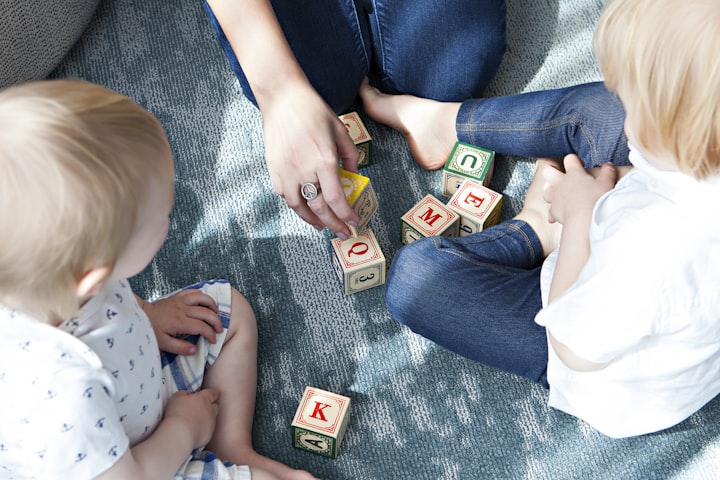10 Ways to Show To Your Child That You Love Him
It's important for the child to feel loved.

Children are more emotional than adults. If they are not told at least once a day that they are loved, they will feel lonely, ignored, and unhappy. That child who knows he is loved is happy, so his father must communicate with the little one in such a way that he feels surrounded by affection.
First of all, the love shown by the parent must be unconditional. So the child must understand that the parent will love him whether he gets a good or a bad grade. Of course, the parent should show appreciation and encouragement if the little one is successful. But he must also be careful when the little one makes a mistake, at the same time implying that even though he rebukes him, this does not affect his attachment. ".
Here are 10 ways to show your child that you are loved.
Look the baby in the eye as you speak.
It seems that we can listen to what the child is saying as we prepare food, write an e-mail, and so we think we can catch two rabbits at once. In reality, sharing attention can make your child feel like you are in second place.
So, the next time the little one wants to talk to you, put aside what you are doing and look him in the eye, paying close attention to him. Ask him a question or two that shows that you listen and that you are interested in the conversation. If you can't give up what you're doing right now, ask him to give you a moment to finish your task, then make sure you get back to the discussion.
Spend time together.
Even 10 minutes a day is enough. It is important to be dedicated to the child, without interruptions. Let your child decide what to do together and, if possible, disconnect the phone or - better yet - leave it in another room so that you are not tempted to check calls or messages.
Ask questions about the child's concerns.
Avoid general topics. Instead of talking about "How was school?", Ask him questions that show that you are aware of what is going on in his life.
Create family traditions.
No need to invent a bicycle. Identify what you like most about doing together. For example, many people prefer to prepare pancakes on Sundays and read books in the evening or play chess/checkers. Such simple traditions can go a long way in building a special connection between parent and child.
Be affectionate.
A kiss on the cheek, a hug before bed will make the child feel loved. Create your handshake or come up with a fun coded word that only you and your child can understand.
Respect her preferences!
Even if you don't have the same preferences as your child, show him that you appreciate what he loves. It's a great way to show that he's important to you. Listen to it enthusiastically as it explains how your favorite toy works or what your favorite cartoon character did.
Praise him.
Don't be afraid to praise him as much as possible. Children who are praised and encouraged by their parents are more likely to have more developed social skills, as well as greater empathy and compassion. These children have high self-esteem and are more motivated to succeed.
Discuss openly the emotions experienced.
Children have unpleasant feelings such as sadness, disappointment, frustration, anger, and fear. These feelings are often expressed through crying, screaming, and provocative behaviors. Unconsciously, through these manifestations, the child announces that he needs something. By paying attention to the child's feelings, the parent shows care and understanding. The child will know that regardless of the situation, he will find emotional support in the parent.
Talk to your child about how to define and manage negative emotions. You can also use therapeutic storybooks to help him see that everyone has feelings.
Encourage him to overcome his challenges.
"You tied your laces to your boots! It was very hard at first, but you kept working and now you have learned to tie your laces yourself. Bravo! "
When the child fails to do something, he may feel frustrated, which may lead him to give up. Parents can help them turn challenging moments into learning opportunities by highlighting their efforts and sharing the message that learning something new takes time, perseverance, and patience.
So, when the child does not succeed, the parent should not argue with him but should inspire confidence. Children with this mentality tend to surpass those who believe that their abilities should be natural, that is, they have them or not. The encouraged and praised child will know - with time, patience, and hard work he will succeed.
Recognize that you are not ideal.
Don't be afraid to admit that you could be wrong. But you don't have to blame yourself either. It is best to start an honest conversation with the child. Just as you show compassion and understanding to the child when he is wrong, he will learn to react to you.
The child will also learn from you that making mistakes is okay and will know what to do to fix your mistake. If you talk to your child about the problems you are experiencing and what you are doing to improve the situation, you can come up with ideas for strategies that your little one will use in life.
All parents love their children. But love must always be shown not only by words but also by deeds and emotions.





Comments
There are no comments for this story
Be the first to respond and start the conversation.